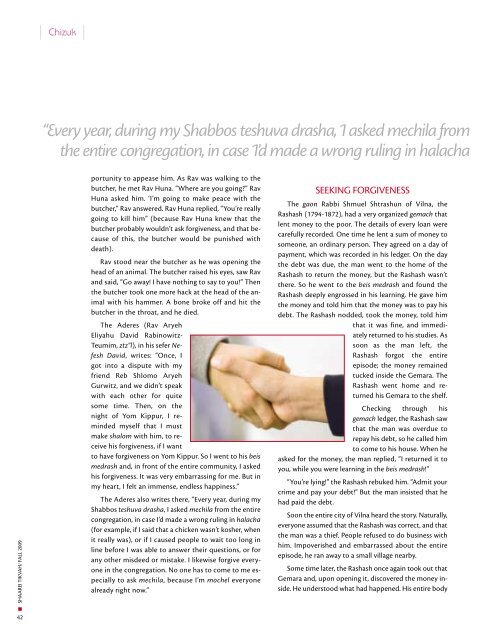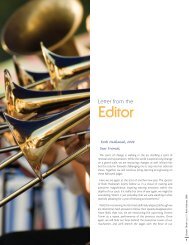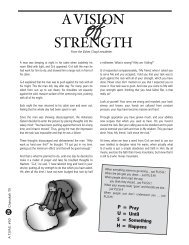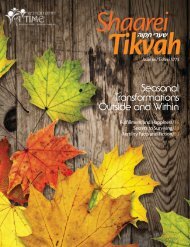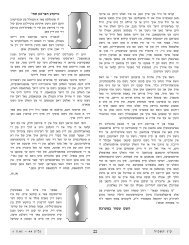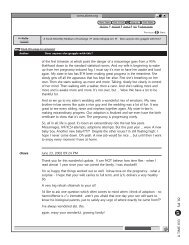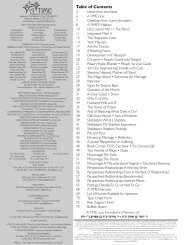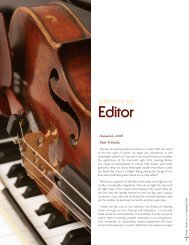Rosh Hashana 5770/2009 - Jewish Infertility
Rosh Hashana 5770/2009 - Jewish Infertility
Rosh Hashana 5770/2009 - Jewish Infertility
Create successful ePaper yourself
Turn your PDF publications into a flip-book with our unique Google optimized e-Paper software.
Chizuk<br />
“Every year, during my Shabbos teshuva drasha, I asked mechila from<br />
the entire congregation, in case I’d made a wrong ruling in halacha<br />
SHAAREI TIKVAH/ FALL <strong>2009</strong><br />
portunity to appease him. As Rav was walking to the<br />
butcher, he met Rav Huna. “Where are you going” Rav<br />
Huna asked him. ‘I’m going to make peace with the<br />
butcher,” Rav answered. Rav Huna replied, “You’re really<br />
going to kill him” (because Rav Huna knew that the<br />
butcher probably wouldn’t ask forgiveness, and that because<br />
of this, the butcher would be punished with<br />
death).<br />
Rav stood near the butcher as he was opening the<br />
head of an animal. The butcher raised his eyes, saw Rav<br />
and said, “Go away! I have nothing to say to you!” Then<br />
the butcher took one more hack at the head of the animal<br />
with his hammer. A bone broke off and hit the<br />
butcher in the throat, and he died.<br />
The Aderes (Rav Aryeh<br />
Eliyahu David Rabinowitz-<br />
Teumim, ztz”l), in his sefer Nefesh<br />
David, writes: “Once, I<br />
got into a dispute with my<br />
friend Reb Shlomo Aryeh<br />
Gurwitz, and we didn’t speak<br />
with each other for quite<br />
some time. Then, on the<br />
night of Yom Kippur, I reminded<br />
myself that I must<br />
make shalom with him, to receive<br />
his forgiveness, if I want<br />
to have forgiveness on Yom Kippur. So I went to his beis<br />
medrash and, in front of the entire community, I asked<br />
his forgiveness. It was very embarrassing for me. But in<br />
my heart, I felt an immense, endless happiness.”<br />
The Aderes also writes there, “Every year, during my<br />
Shabbos teshuva drasha, I asked mechila from the entire<br />
congregation, in case I’d made a wrong ruling in halacha<br />
(for example, if I said that a chicken wasn’t kosher, when<br />
it really was), or if I caused people to wait too long in<br />
line before I was able to answer their questions, or for<br />
any other misdeed or mistake. I likewise forgive everyone<br />
in the congregation. No one has to come to me especially<br />
to ask mechila, because I’m mochel everyone<br />
already right now.”<br />
SEEKING FORGIVENESS<br />
The gaon Rabbi Shmuel Shtrashun of Vilna, the<br />
Rashash (1794-1872), had a very organized gemach that<br />
lent money to the poor. The details of every loan were<br />
carefully recorded. One time he lent a sum of money to<br />
someone, an ordinary person. They agreed on a day of<br />
payment, which was recorded in his ledger. On the day<br />
the debt was due, the man went to the home of the<br />
Rashash to return the money, but the Rashash wasn’t<br />
there. So he went to the beis medrash and found the<br />
Rashash deeply engrossed in his learning. He gave him<br />
the money and told him that the money was to pay his<br />
debt. The Rashash nodded, took the money, told him<br />
that it was fine, and immediately<br />
returned to his studies. As<br />
soon as the man left, the<br />
Rashash forgot the entire<br />
episode; the money remained<br />
tucked inside the Gemara. The<br />
Rashash went home and returned<br />
his Gemara to the shelf.<br />
Checking through his<br />
gemach ledger, the Rashash saw<br />
that the man was overdue to<br />
repay his debt, so he called him<br />
to come to his house. When he<br />
asked for the money, the man replied, “I returned it to<br />
you, while you were learning in the beis medrash!”<br />
“You’re lying!” the Rashash rebuked him. “Admit your<br />
crime and pay your debt!” But the man insisted that he<br />
had paid the debt.<br />
Soon the entire city of Vilna heard the story. Naturally,<br />
everyone assumed that the Rashash was correct, and that<br />
the man was a thief. People refused to do business with<br />
him. Impoverished and embarrassed about the entire<br />
episode, he ran away to a small village nearby.<br />
Some time later, the Rashash once again took out that<br />
Gemara and, upon opening it, discovered the money inside.<br />
He understood what had happened. His entire body<br />
42


